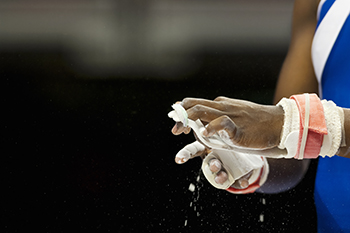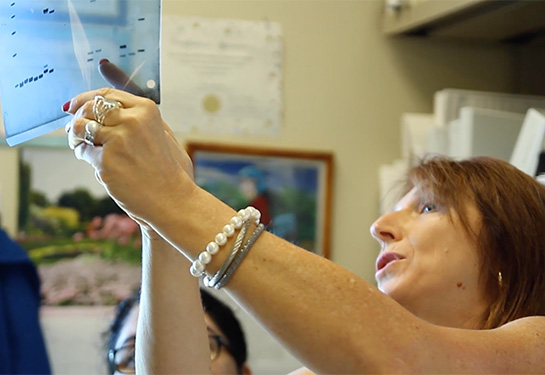Simone Biles’ withdrawal at Olympics shines light on need to recognize mental health
Brandi Liles felt sadness and pride when she heard that gymnast Simone Biles had withdrawn from the Olympic competition for mental health reasons.

On Tuesday, Biles lost herself in mid-air while vaulting, completing 1 1/2 twists instead of 2 1/2. Gymnasts refer to this terrifying – and sometimes career-threatening – loss of control as “the twisties.”
She consulted with U.S. team doctor Marcia Faustin, a UC Davis Health Sports medicine physician, before withdrawing. Later, Biles said, “Once I came out here, I was like, ‘The mental is not there, so I just need to let the girls do it and focus on myself.”
Liles, a clinical psychologist at UC Davis Children’s Hospital, is a big fan of gymnastics. She was sad that Biles would not be competing on one of the world’s greatest stages. But she also felt pride that Biles recognized her symptoms and took action.
“She’s listening to herself, listening to her body. Recently, gymnasts especially have disclosed the pressure of toxic environments and abusive or neglectful coaches. When you were trained in a toxic culture of emotional and sexual abuse, that kind of step is incredible. It just demonstrates her resilience in light of all this pressure,” said Liles, who noted that Biles’ current coaches were supportive of her decision.
Tremendous pressure on elite athletes
Elite athletes face the kind of extreme pressure that can harm mental health. In June, tennis champion Naomi Osaka withdrew from the Wimbledon tournament, citing mental health struggles. Legendary swimmer Michael Phelps has spoken up about his depression and thoughts of suicide.
“For all sports, but especially for elite sports, we put pressure on achievement over well-being. We treat athletes almost like they are products instead of people,” said Liles.
She sees similar pressure impacting all levels of sports, even those for children. “Sports are supposed to be fun and entertaining. We shouldn’t only value people because they are the best gymnast or vaulter or swimmer. We need to treat athletes like humans and reduce the shame of not being able to perform or achieve. We need more compassion.”
— Brandi Liles
Liles hopes this will be a watershed moment to understand that mental health is not separate from physical health.
“We need to create an environment for people to talk about mental health without stigmatization. We wouldn’t bat an eye if Simone Biles broke her arm or tore a meniscus. We wouldn’t question the validity of the withdrawal. We need to view this mental health decision in the exact same light we would view a physical illness or injury,” said Liles.
“The bravery and courage of these athletes who are now talking publicly about the importance of their mental health will change the culture for many, many athletes in the future,” said Liles. “I extend my gratitude to the risk they are taking to improve experiences for others coming up behind them.”
History of abuse at USA Gymnastics
In addition to the pressure of being an elite athlete, Biles revealed three years ago that she was one of hundreds of survivors abused by Larry Nassar, the former team doctor for USA Gymnastics.
Biles is the only publicly known survivor of Nassar who continues to compete in gymnastics, according to Insider. She has said that she is returning to the Olympics to be a voice for survivors.
Liles has never treated Biles, but she is a trauma expert specializing in treating children, adolescents and young adults who are survivors of abuse and other trauma exposures.
Sexual abuse is more prevalent than just high-profile cases like Nassar’s. “Research shows that one in four girls and one in six boys will be sexually abused by the time they are a young adult,” said Liles.
Symptoms of trauma, stress and PTSD
Many survivors experience a type of post-traumatic stress disorder (PTSD) similar to war veterans. Liles and other clinicians at the UC Davis CAARE (Child and Adolescent Abuse Resource and Evaluation) Diagnostic and Treatment Center practice trauma-informed care. It involves an understanding of the broad impact of traumatic stress reactions and teaching the survivors skills to manage these reactions.
Common symptoms experienced by survivors of abuse can include situations (people, places or experiences) that trigger unwanted thoughts or memories, numbing of emotions, negative patterns of thoughts, and physical changes like being unable to sleep.
Liles does not know if Biles was experiencing any of these symptoms, but they are common among survivors. “As a trauma expert looking at her experience, I’m wondering about trauma symptoms, nightmares, sleep problems, hypervigilance, anxiety, a negative view of herself or the world as a whole.”
“All of these can wreak havoc on someone’s mental health,” said Liles.
For resources about sexual violence at UC Davis and UC Davis Health, link here. Additional resources can be found at RAAIN, The National Child Traumatic Stress Network and the National Sexual Resource Center.



